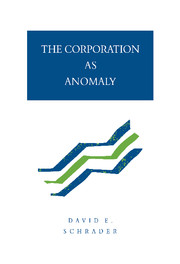Book contents
- Frontmatter
- Contents
- Preface
- Introduction
- 1 The hidden change in economic theory
- 2 Four views of scientific change
- 3 A glance at the history of economic theory
- 4 Agreement and disagreement within the tradition
- 5 Theories of the firm
- 6 Confusions and problems with the marginalist view
- 7 The shape of the large managerial corporation
- 8 The theoretical impact of a better theory of the firm
- Notes
- Bibliography
- Index
8 - The theoretical impact of a better theory of the firm
Published online by Cambridge University Press: 10 December 2009
- Frontmatter
- Contents
- Preface
- Introduction
- 1 The hidden change in economic theory
- 2 Four views of scientific change
- 3 A glance at the history of economic theory
- 4 Agreement and disagreement within the tradition
- 5 Theories of the firm
- 6 Confusions and problems with the marginalist view
- 7 The shape of the large managerial corporation
- 8 The theoretical impact of a better theory of the firm
- Notes
- Bibliography
- Index
Summary
Over the course of the past seven chapters we have looked at the development of the marginalist theory of the firm as a part of what now stands as traditional economics and at key characteristic features of the modern large managerial corporation. I have argued, first, that the rise of the marginalist theory of the firm constituted a major change of near revolutionary proportions in the fabric of the tradition in economic theory going back to Smith. Yet I have also suggested, second, that something very much like the present marginalist theory of the firm was the only way of developing a theory of the firm and, at the same time, maintaining a commitment to the methodological individualism that has dominated economic theory since the time of Smith. As a third point, I have argued that while the marginalist theory of the firm is a significantly troubled aspect of economic theory, it nevertheless retains its dominance, at least among economic theorists, by virtue of its status as a part of the more general marginalist theory. Finally, I have argued that those features of the large managerial firm that are most characteristic of that institution are precisely those that are most at odds with the core commitments of traditional marginalist economic theory as I have identified them in Chapter 4.
Undoubtedly many questions remain, but surely one of the most important ones as well as the one that will provide the focus for this final chapter, is this: How significant must be the changes in general economic theory in order for such a general theory to accommodate a more fruitful theory of the firm? We see two quite different answers given to that question.
- Type
- Chapter
- Information
- The Corporation as Anomaly , pp. 156 - 174Publisher: Cambridge University PressPrint publication year: 1993



